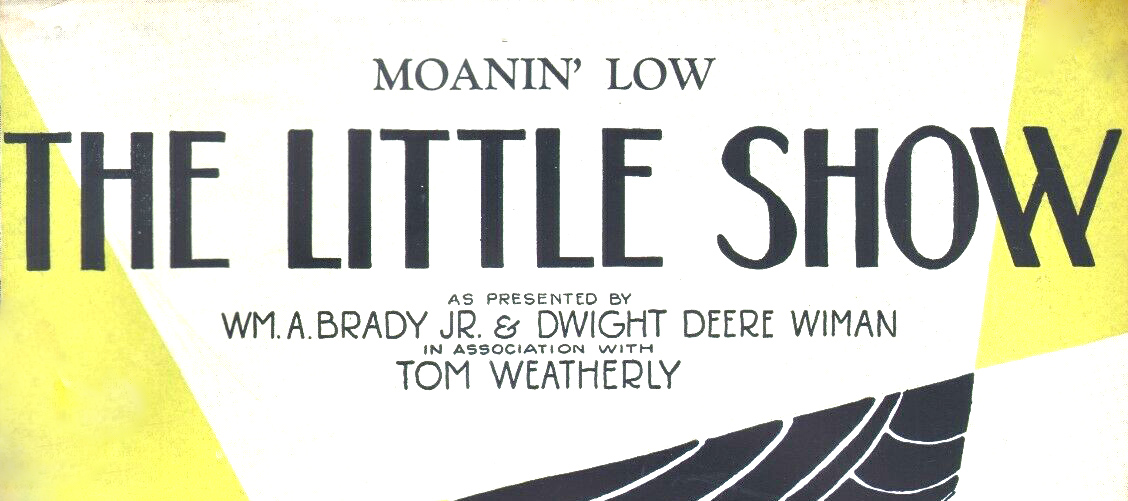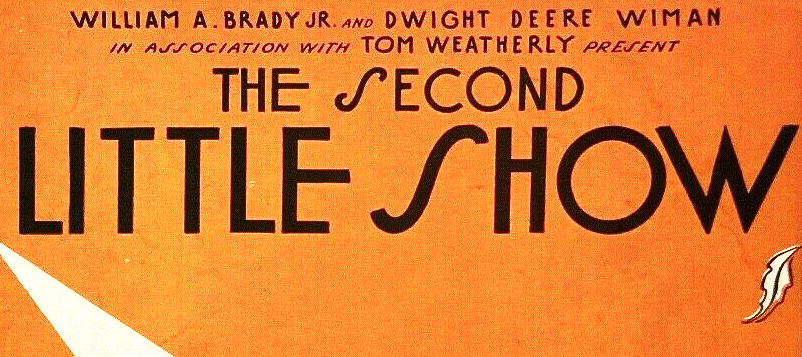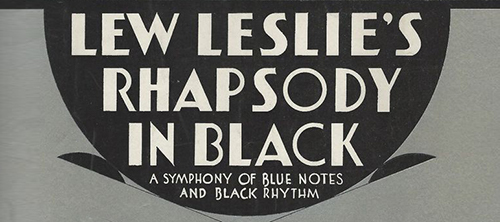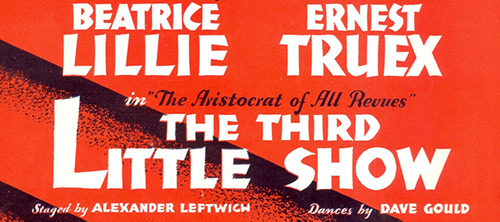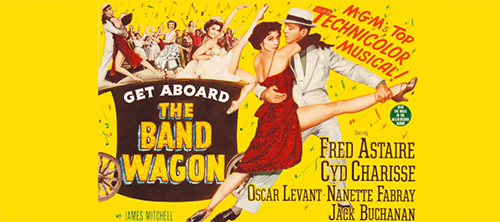Pas de biographie disponible.
Compositeur Musique additionelle Librettiste Parolier Metteur en scène Chorégraphe Producteur création Producteur version
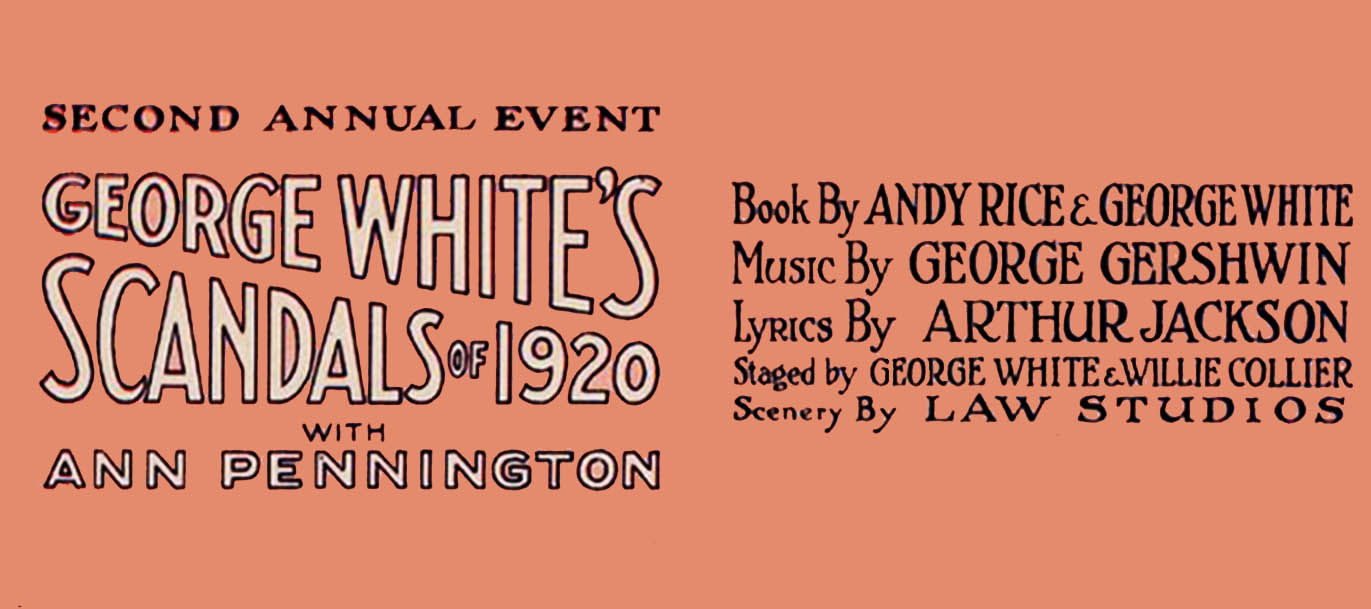
Revue
Musique: *** Divers • Paroles: *** Divers • Livret: *** Divers • *** Revue • Production originale: 13 versions mentionnées
Dispo:
Les George White' Scandals sont une longue série de revues de Broadway produites par George White de 1919 à 1939, inspirées des Ziegfeld Follies. Les Scandals ont lancé la carrière de nombreux artistes, y compris W. C. Fields, les Three Stooges, Ray Bolger, Helen Morgan, Ethel Merman, Ann Miller, Eleanor Powell, Bert Lahr et Rudy Vallée. Louise Brooks, Dolores Costello, Barbara Pepper et Alice Faye ont lancé leur show-business en tant que filles richement habillées (ou sous-habillées) se pavanant à la "Scandal Walk". Une grande partie des premières compositions de George Gershwin parut dans les éditions 1920-24 de Scandals. The Black Bottom, dansé par la star des Ziegfeld Follies, Ann Pennington et Tom Patricola, a déclenché un engouement pour la danse américaine.
Genèse:
Résumé:
Création: 2/6/1919 - Liberty Theatre (Broadway) - 128 représ.
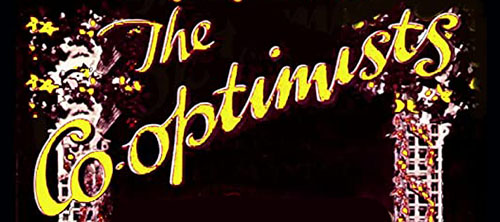
Revue
Musique: *** Divers • Paroles: *** Divers • Livret: *** Revue • Production originale: 1 version mentionnée
Dispo: Résumé
Genèse:
Résumé: Le programme se composait de nombreux courts numéros très différents dans le style revue.
Création: 27/6/1921 - Royalty Theatre (Londres) - représ.
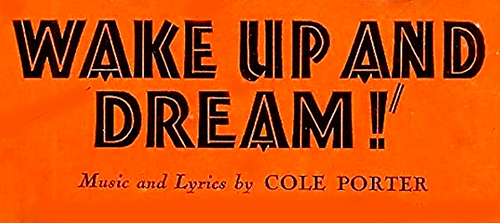
Revue
Musique: Cole Porter • Paroles: Cole Porter • Livret: *** Revue • John Hastings Turner • Production originale: 1 version mentionnée
Dispo: Résumé Commentaire Génèse Liste chansons
Wake Up and Dream is a musical revue with a book by John Hastings Turner and music and lyrics by Cole Porter and others. The most famous song from the revue is the Porter standard "What Is This Thing Called Love?" The revue opened in London while Porter's Paris was still running on Broadway. Producer Charles B. Cochran asked Porter to write the score, even though in their previous dealings Porter had treated him with some discourtesy. Opening on December 30, 1929, the production was the last to open on Broadway in the 1920s.
Genèse: The piece originally was called Charles B. Cochran's 1929 Revue. Tryouts began on 5 March 1929 at the Palace Theatre in Manchester, England. It then opened on 27 March 1929 at the London Pavilion and ran for 263 performances. The production was directed by Frank Collins with choreography by Jack Buchanan, Tilly Losch, and Max Rivers, with a cast that featured Jessie Matthews, Sonnie Hale, Tillie Losch, Douglas Byng and Elsie Carlisle. After the London production closed, a Broadway production opened at the Selwyn Theatre on 30 December 1929 and closed on 26 April 1930 after 136 performances. Produced by Arch Selwyn in association with Cochran, the London director and choreographers reprised their work, and the cast featured Buchanan (replacing Hale), Matthews and Losch.
Résumé: The show was a revue with 24 sets, 500 costumes, a large international cast, and "a thread of a book." The song "Let's Do It, Let's Fall in Love" (performed in London) had "sensual choreography," and was set in front of a large African idol, with a tom-tom beat with Tilly Losch dancing and Elsie Carlisle singing in torch singer style. The elaborate ballet for the song "Wake Up and Dream" uses folklore and history. "Coppélia" is danced as seen from the wings. According to critic Brooks Atkinson of The New York Times, "A 'Gothic' number, to music by Bach, brings the reverence of the cathedral into the theatre."
Création: 30/12/1929 - American Airlines Theatre (Broadway) - 136 représ.
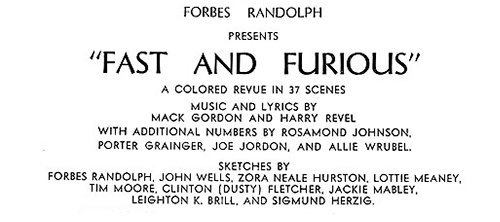
Revue
Musique: Harry Revel • Paroles: Mack Gordon • Livret: *** Revue • Production originale: 1 version mentionnée
Dispo: Commentaire
The revue was the first of five black revues and musicals to open during the season, and it was followed by Singin’ the Blues, Sugar Hill, Blackberries of 1932, and Yeah Man.
Genèse:
Résumé:
Création: 15/9/1931 - Studio 54 (Broadway) - représ.
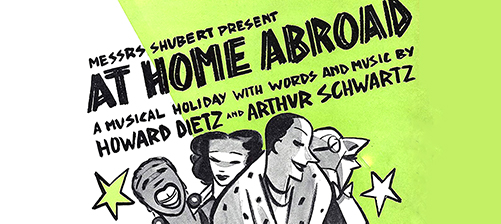
Revue
Musique: Arthur Schwartz • Paroles: Howard Dietz • Livret: *** Revue • Production originale: 1 version mentionnée
Dispo: Résumé Génèse Liste chansons
At Home Abroad is a revue with music by Arthur Schwartz and lyrics by Howard Dietz. It introduced the songs "Love Is a Dancing Thing", "What a Wonderful World" and "Got a Bran' New Suit", among others. The revue follows a bored couple who flee America and go on a musical world tour.
Genèse: The original Broadway production opened at the Winter Garden Theatre on September 19, 1935, and ran for 198 performances. It featured in the cast Beatrice Lillie, Ethel Waters, Herb Williams, Eleanor Powell, Paul Haakon, Reginald Gardiner, Eddie Foy Jr., Vera Allen, and John Payne . Sketches were scripted by Raymond Knight, Marc Connelly and others. The revue was produced by Messrs. Shubert, and directed by Vincente Minnelli and Thomas Mitchell; the first Broadway musical to be directed by Minnelli.
Résumé: The setting is a cruise around the world, featuring 25 musical numbers at various locations: a London store, an African jungle ("Hottentot Potentate"), a Balkan country where Powell taps spy messages, and a West Indies dockside for "Loadin' Time", to mention a few. The revue gave Bea Lillie the range of a variety of exotic locations. She had the tongue-twister lines "two dozen double damask dinner napkins"; became a Russian ballerina who could not "face the mujik"; and disrupted the line of geisha girls with "It's better with your shoes off" in a Japanese garden. In "Paree", she was a Parisian grisette in the Moulin Rouge in Paris, and "made something of a carnival of this song, with lyrics like 'I want to kiss your right bank, kiss your left bank; kiss Montparnasse' with the emphasis on the last syllable."
Création: 19/9/1935 - Winter Garden Theatre (Broadway) - 198 représ.
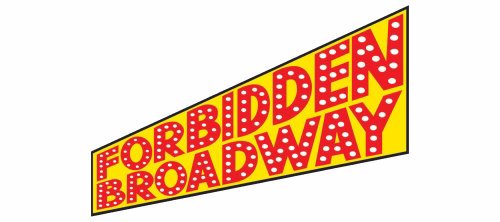
Musical
Musique: *** Divers • Paroles: *** Divers • Livret: *** Revue • Production originale: 19 versions mentionnées
Dispo: Résumé
Genèse:
Résumé: Unemployed actor Gerard Alessandrini wanted a showcase for his talents and put together as a nightclub act, a selection of some of the musical parodies of Broadway shows he had written. Lauded by critics and audiences alike Forbidden Broadway has since become New York's longest running musical comedy revue, winning Drama Desk, Obie and Outer Critics Circle Awards, and recently receiving a Tony Honor.
Création: 4/5/1982 - Triad Theatre (Broadway (Off)) - représ.
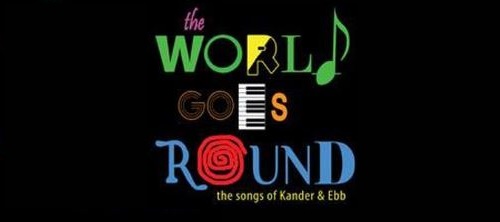
Musical
Musique: John Kander • Paroles: Fred Ebb • Livret: *** Revue • Production originale: 1 version mentionnée
Dispo: Résumé Synopsis Génèse Liste chansons
Enter the world of distinguished and celebrated writing team Kander and Ebb. The World Goes 'Round is a stunning revue of the songbook from the multi-TONY-award-winning team with the original production winning 3 Drama Desk Awards.
Genèse: The World Goes 'Round is a musical revue showcasing the songs of John Kander and Fred Ebb. The revue takes its title from a tune the songwriting team wrote for Liza Minnelli to sing in the Martin Scorsese film New York, New York. The show consists of an eclectic collection of love songs, torch songs, and acerbicly witty comic numbers. It was conceived by director Scott Ellis, choreographer Susan Stroman, and librettist David Thompson, who collaborated on such Kander and Ebb shows as Steel Pier and the 1996 revival of Chicago. David Loud created the vocal and dance arrangements. Productions The World Goes 'Round premiered in New York City on March 18, 1991 at the Westside Theatre. Its cast included Karen Ziemba, Robert Cuccioli, Karen Mason, Brenda Pressley, and Jim Walton. The show received critical praise and a satisfying run of 408 performances. Starting in August 1992, Ziemba, Blum, and Mazzie were joined by John Ruess and Shelley Dickinson for a 10-month US national tour. With scenic and technical embellishments added and the title simplified to The World Goes 'Round, the revised edition included mostly upbeat, unfamiliar songs from the team's lesser-known musicals.
Résumé: Filled with humor, romance, drama, and nonstop melody this title is a thrilling celebration of life and the fighting spirit that keeps us all going. Five individuals find themselves careening through the world of love, babies, and coffee. From Cabaret to Chicago the non-stop hit-parade features unforgettable gems including "Mr. Cellophane," "Maybe this Time," "Cabaret," and "New York, New York", seamlessly interwoven into a passionate, harmonious, up-tempo evening of musical theatre.
Création: 18/3/1991 - Westside Theatre Downstairs (Broadway (Off)) - représ.
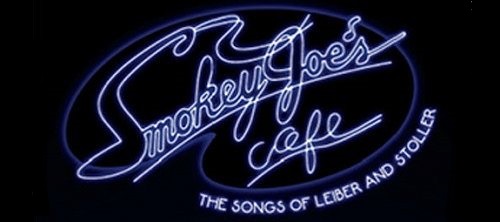
Musical
Musique: Jerry Leiber • Mike Stoller • Paroles: Jerry Leiber • Mike Stoller • Livret: *** Revue • Production originale: 4 versions mentionnées
Dispo: Résumé Génèse Liste chansons
Genèse: Smokey Joe's Cafe was conceived by Stephen Helper, Jack Viertel, and Otis Sallid. Presented in a revue format with no unifying theme, it showcases 39 songs, sung by members of the cast in various combinations, with no dialogue. The musical had its world premiere at the Ahmanson Theatre in Los Angeles where it ran from November 1994 to January 22, 1995. The revue opened on Broadway on March 2, 1995 at the Virginia Theatre and closed on January 16, 2000 after 2,036 performances. Directed by Jerry Zaks with choreography by Joey McKneely, the nine person cast featured Ken Ard, Brenda Braxton, Victor Trent Cook, B. J. Crosby, and DeLee Lively. Throughout its run, there were special appearances by many popular singers, including Pam Tillis (April 1999), Gladys Knight (May 1999), Tony Orlando (June 1999), Lou Rawls (April 1999), Gloria Gaynor (August 1999) and Rick Springfield (October 1999). Gladys Knight also appeared in the tour when it played Boston in February 2000. The final performance was filmed and later released on DVD in 2001. It premiered in the West End at the Prince of Wales Theatre on October 1, 1996 and ran through January 1, 1997. Zaks directed and McKneely choreographed, with some of the Broadway cast (Cook, Lively and Crosby) repeating their roles.
Résumé: The songs of Leiber And Stoller are presented in various combinations with no dialogue in this musical revue style dance and song celebration of Rock & Roll.
Création: 2/3/1995 - August Wilson Theatre (Broadway) - représ.

.png)
.png)






